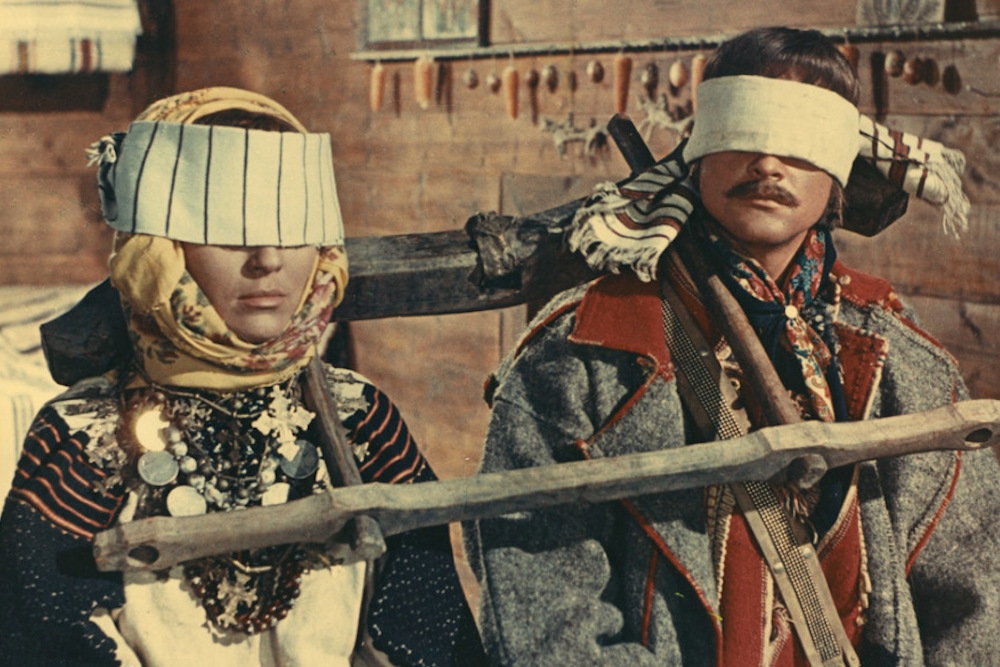
Seeing Sergei Parajanov’s “Shadows of Forgotten Ancestors” on the big screen is a rare opportunity to marvel at the film’s heady mix of forbidden love and magical realism among the snowy forests and ethnic traditions in the mountains of Ukraine. Today, some 60 years since the film’s release, audiences can recognize yet another layer of the filmmaker’s classic drama — the horrors of war.
As Russia’s full-scale invasion of Ukraine marks its first year, it’s estimated that tens of thousands of lives have been lost and millions have been uprooted from their homes. The costs of war can also be counted culturally.
“Ukrainian cultural heritage is being targeted and destroyed,” said Sasha Razor, a film studies lecturer at UC Santa Barbara who helped bring “Shadows of Forgotten Ancestors” to campus for an upcoming screening. “Museums in occupied territories are being pillaged and cultural sites are being bombed. Watching this movie and learning about Ukrainian culture is an important step in diplomacy and a gesture of solidarity with Ukrainian culture workers, many of whom are fighting in this war.”
“Shadows of Forgotten Ancestors” will be screened from 7–9:20 p.m., Thursday, March 2, in the Pollock Theater, followed by a discussion between Razor and Roman Koropeckyj, a professor in the Department of Slavic, East European and Eurasian Languages and Cultures at UCLA. The event is free and open to the public; reserving advanced tickets is recommended.
The Film and its Maker
The film, based on the 1912 eponymous novel by Ukrainian author Mykhailo Kotsubinsky, provides a glimpse into the regional Hutsul culture, an ethnic group of the Carpathian range in Ukraine, Poland, Slovakia and Romania. The story, steeped in tradition and folklore of a bygone era, centers around the love between a young couple from rival families.
“The significance of the film includes its role in launching the new wave of Ukrainian poetic cinema and celebrating the folk culture and regional identity, and I would say that it resonates not only with Ukrainians but also with the global audience,” Razor said. “What is there not to love about the Romeo and Juliet of Transcarpathia? It's the ultimate neo-romantic drama shot in an ethnographic mode by a genius director whose work transcends his time and place.”
Of Armenian descent, Parajanov was born in the Soviet Union and grew up in Georgia and studied in Moscow. “He understood the struggles of ethnic cultures across the region,” said Razor, who will be teaching a seminar on Ukrainian cinema this spring.
The film itself — with its focus on ethnic identity, literary culture and folklore — was seen as a subversive political gesture, she added. “During the Soviet Union, many ethnic groups were denied their rights to their identities,” she said. At the same time, Ukrainian dissident artists and activists were being arrested and imprisoned, such as poet Vasyl Stus, who died in the Gulag prison system.
Starting in the mid-1960s, most of Parajanov’s work was banned by the Soviet government. In 1973, he was arrested for the crime of homosexuality and also charged falsely with rape, and imprisoned until 1977. His work remained banned in the Soviet Union but he did return to directing in the mid-1980s after a 15-year hiatus. Decades later, his cinematic legacy remains elevated among the most revered and influential filmmakers in history.
From Kyiv to Campus
In the fall of 2022, UCSB’s Carsey-Wolf Center called on Razor to suggest a film for its CWC Global series. Together they began coordinating with a team of archivists and curators at the National Oleksandr Dovzhenko Film Centre in the war-torn Ukrainian capital of Kyiv to secure a digital transfer of a restoration of “Shadows,” subtitled in English.
“Despite the difficult circumstances, the film workers continued to answer emails during bombing raids and frequent blackouts,” Razor said. “Their courage and professionalism are something I never cease to admire. It is important to me personally to include my colleagues from Ukraine as much as possible in various international collaborations so that they can continue doing their work and remain culture professionals despite the war.
“Now, with the growing demand for Ukrainian cinema,” she added, “I really hope that access to the newly restored films becomes a bit easier for Western viewers. After all, these films were made to watch on a large screen.”
(805) 893-3207



